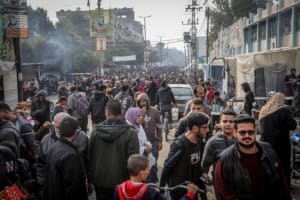Messianic Jews and Christian Arabs - Citizens and ambassadors in the Holy Land

A Christian Arab from the Holy Land once defined himself, saying: I am an Israeli, but not a Jew; Palestinian, but not in the diaspora; Arab, but not a Muslim; Christian, but not a Catholic; Evangelical, but not a Pentecostal... The listeners were puzzled and asked: So, who are you?
Of course, most people in the West are not familiar with the fine details of the population of our region and what are the meaning and consequences of a minority within a minority within a minority. Although everybody says that we live in a global village, very few people are cosmopolitan.
A bird's eye view:
About nine million people live in Israel, the majority of whom are Jews from various background (mainly defined as one of two groups: Ashkenazic, i.e., descendants of Jews from Europe and Sephardic, i.e., descendants of Jews from Spain, North Africa and the Middle East. There are also other subgroups of Jews according to the origins of their families.
More than 20% of Israeli citizens are Arabs (most of whom are Muslims, in addition to about 160,000 Druze (an ethno-religious sect) and a similar number of Christians of various denominations. Within the evangelical circles, there are more than 4,000 Christian Arabs and more than 12,000 Messianic Jews. Under the West Bank Palestinian authority live about three million people, the vast majority of whom are Muslims (except for about 40,000 Christians and 700 Samaritans). In the Gaza Strip there are more than two million people, the vast majority of whom are Muslims (except for 700 Christians).
The purpose of this introduction is not mere statistics, of course, but rather to introduce the country and the complex situation in which we live, especially since we are asked these questions repeatedly.
Politics
1. General:
In our region, people are so involved in politics, there are many who are interested and follow political events for hours daily, which takes up a large part of their lives in following news, bulletins, discussions, demonstrations, etc. And there are of course those who love the subject and study it (two out of six members in our household hold a master’s degree in political science).
2. Church and politics:
It gets complicated when the Church or church leaders do not just express their opinions, but also declare their positions on political matters publicly and powerfully. Throughout history, the more the church has intervened in politics, the less value it has in the eyes of the side it supports no less than the opposed side, thus becoming less respected and less effective spiritually.
There is a difference between isolation and active integration into politics and it is important that our Christian character and testimony remain clear and bright, so that we do not become tarnished, dissolve, or get lost in the folds of the political currents of society.
3. A personal test:
Do I speak, think, yearn, and even rave about political matters or entities, more than the Lord Jesus, the savior, the supreme controller of all matters, even in politics, yesterday, today, and in the future?
Do we really believe that we are helping God fulfill the prophecies that He himself revealed to the prophets, and would our political positions and orientations affect His plans? If we say yes, then we are belittling and diminishing God.
Messianic Jews and Christian Arabs:
1. Background:
We are a small minority (and a smaller number of MBBs, i.e., Muslim background believers). We`re people coming from different backgrounds, having their own struggles and challenges, and may disagree on different issues. It`s only natural that we love our sectors and sympathize with their issues, which are many and complex.
It`s very important to cry with our own people and try to support them as much as we can. It was written that the Lord "in all their affliction He was afflicted” (Is. 63: 9), how much more should we be afflicted, identify with each other, and try with all our capabilities to help our society, especially the household of God.
2. A new creation:
We need to remember that as believers from every background we were made one through the redemptive work of Christ who “has made us both one and has broken down in his flesh the dividing wall of hostility… that he might create in himself one new man in place of the two, so making peace” (Eph. 2: 14- 15). Of course, this speaks powerfully to us, Jews and Arabs, who were previously enemies in every sense of the word. But now we are one in the sight of God through our faith in the atonement of Christ, and what a great testimony it is before the whole world.
3. Which unity?
We thank God who made the one body and preserves its unity. Our responsibility is to strive to keep the unity of the Spirit for the glory of God and the benefit of His people. “With all humility and gentleness, with longsuffering, bearing with one another in love, endeavoring to maintain the unity of the Spirit in the bond of peace” (Eph. 4:2- 3).
May we follow God`s calling practically and "let us not grow weary in doing good, for in due season we will reap if we do not give up. Therefore, as we have opportunity, let us do good to all, especially to those who are of the household of faith” (Gal. 6:9-10).
Eschatology or escapology?
Yes, we are believers, but we are still human beings, with our own ethnic and community affiliations. Extremism in our adherence to our national and political affiliation affects and sometimes directs our thought and Biblical understanding, especially the eschatological one. This leads usually to healthy discussions, but sometimes it causes conflict between the members of the one body. This can reactivate our old nature to quarrel, attack or even demonize each other.
Please, do not let eschatology be escapology, i.e., escaping from your new standing in Christ back to your old contradictory affiliations.
Clinging to our theology is okay, but why belittle, criticize and attack all those who hold other eschatological beliefs, and accuse them even with heresy? Instead, eschatology needs a careful and serious study of the Bible in a spirit of humility, meekness and reliance on God.
Whose ambassadors, are we?
Every believer must be a faithful citizen, subject to the authorities, serving his community in everything that does not contradict the word of God. Yet spiritually we belong first and foremost to Jesus, and we`re also His ambassadors in any land in which we live, and our main aim should be calling the people to return with repentance to God. “Therefore, we are ambassadors for Christ, as though God were making an appeal through us; we beg you on behalf of Christ, be reconciled to God” (2 Cor. 5: 20).
A concluding challenge:
As believers coming from various backgrounds and societies, do we adore the past, grab the present and struggle over the future events, or do we appreciate the past and live faithfully in the present and hope for the future, knowing that it is all in God’s hand and His foreknowledge?
I hope many will choose the second option, as this is the healthy way to live, serve and cooperate for the glory of God in our country.
For Messianic Jews and Arab believers, it is due time to show the Christian witness in a genuine loving unity in front of a world full of hatred.
“But you are a chosen people, a royal priesthood, a holy nation, a people for God’s own possession, so that you may proclaim the excellencies of Him who has called you out of darkness into His marvelous light” (1 Pet. 2: 9).

Dr. Makram Meshreky is a Christian Arab lay minister and prolific author. He specializes in Bible background, comparative religion and Jewish & Muslim literature.
You might also like to read this:














